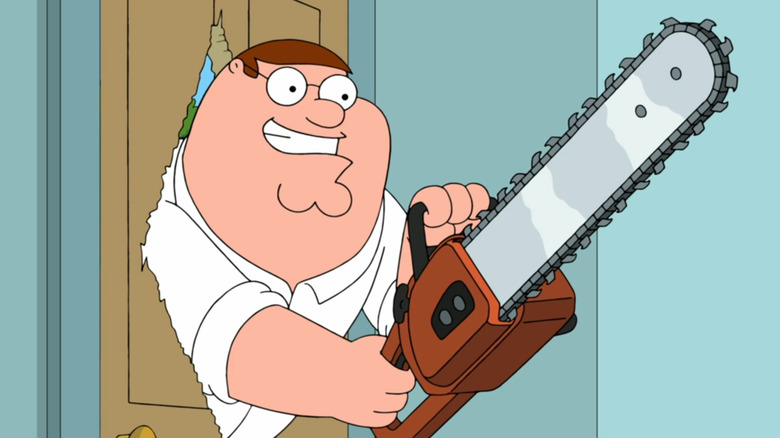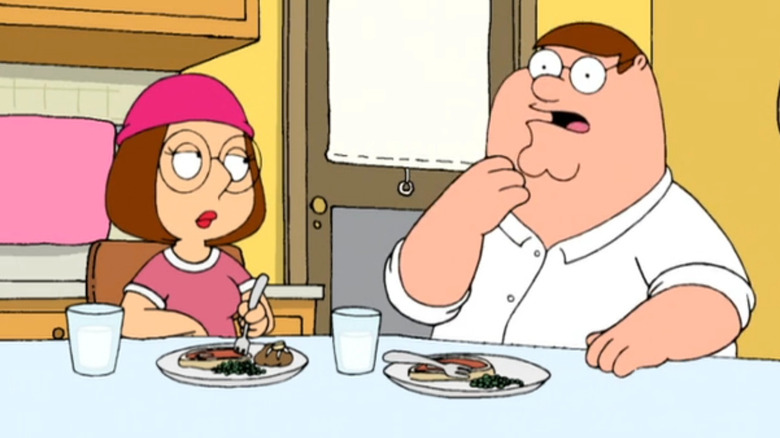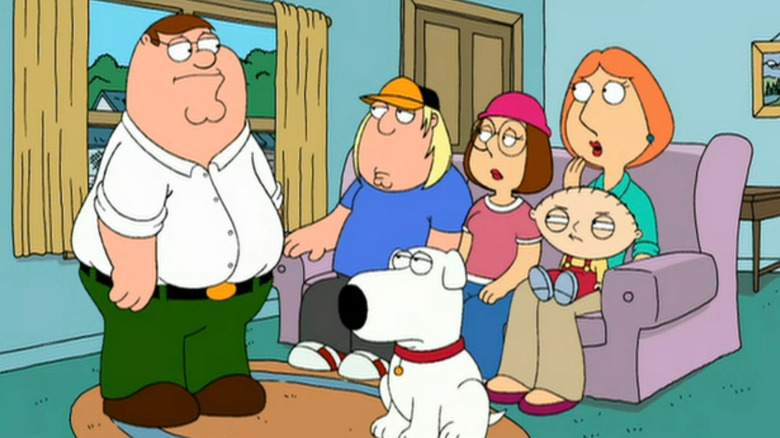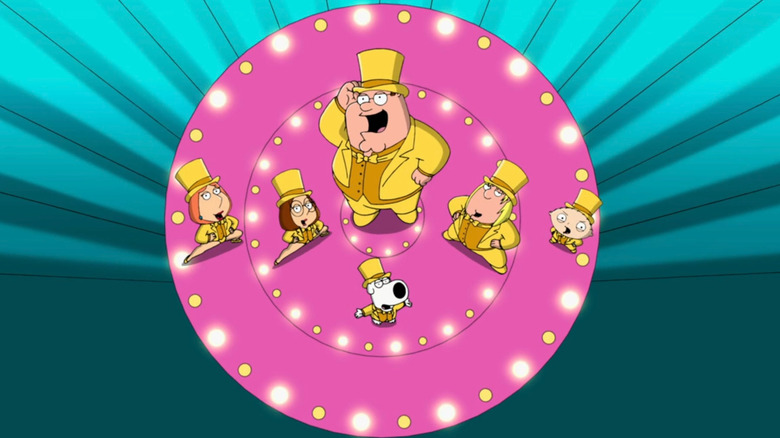Why Family Guy Was Canceled Twice - And How It Came Back From The Dead
Even those who don't watch "Family Guy" are bound to know of its undeniable place as a television staple. The show, which follows the exploits of the dysfunctional Griffin family and the residents of Quahog, Rhode Island, has kept viewers laughing for over 400 episodes and counting, placing it among the longest-running animated shows ever to air. But reaching its current rate of success was not without its fair share of bumps along the road.
Like any show starting out, "Family Guy" took some time to find its footing. Given its newness, Fox did not treat the adult animated series with the same reverence that the network likely has for it nowadays. The show was subject to being tossed around different time slots, going head-to-head with other hit programs, getting taken to different networks, and even having its life cut short on a couple of occasions due to low ratings. However, it wouldn't take long for Fox to realize the mistakes it made as "Family Guy" began amassing an audience that few could have seen coming.
Tough competition made it even tougher for Family Guy
Following a seven-minute preview made by show creator Seth MacFarlane, Fox put in a 13-episode order for "Family Guy." The pilot, "Death Has a Shadow," premiered on January 31, 1999, to follow Fox's airing of Super Bowl XXXIII. Despite controversy over its provocative brand of humor, the episode pulled in a hearty 22 million viewers, proving that MacFarlane's comedy had legs to stand on.
When new episodes started airing in April, "Family Guy" aired on Sunday nights alongside shows such as "The Simpsons" and "The X-Files." Its 1st season picked up decent ratings with 12.8 million households tuning in, ranking it 33rd on the Nielsen ratings. Once its 2nd season came about in September 1999, however, the show was dealt a far more brutal hand with a Thursday night time slot that clashed with NBC's hit series "Frasier." With its numbers dropping at a rapid rate, Fox took to broadcasting "Family Guy" at inconsistent times, with two three-month hiatuses between September and December and between December and March.
The show's return in March 2000 sadly did little to appease these issues. Now airing on Tuesday nights, "Family Guy" again faced major competition, as "Who Wants to Be a Millionaire" on ABC captured viewers' attention. By May, Fox officially pulled the plug on the series.
Adult Swim and high DVD sales gave the show new life
July 2000 would see Fox resurrect "Family Guy" for another batch of 13 episodes. The 3rd season hit television screens in November 2001. It once again faced some hard-hitting competitors, as both "Friends" and "Survivor" occupied its Thursday night time slot. As a result, its ratings continued to fall, and the show was taken off of Fox's schedule in May 2002.
The following year proved to be a game-changing one for "Family Guy." Fox handed the show's rerun rights to Cartoon Network in April 2003. The channel began airing reruns on its nighttime Adult Swim block, where it quickly found an audience, becoming one of the network's highest-rated programs. At the same time, Fox released the first two seasons on DVD to immense success. Within a month, nearly 400,000 copies were sold, which grew to over 2 million by the end of the year. It became 2003's bestselling TV show DVD and was followed by the similarly successful home media release of the 3rd season.
"Family Guy" had now become a certified cult phenomenon, and Fox was quick to act on it. By May 2004, the network announced that the series would return for a 4th season.
Seth MacFarlane thinks the show's death helped improve it
Initially, "Family Guy" creator Seth MacFarlane had little hope that his beloved show would see the light of day ever again, proclaiming in an interview with USA Today, "We kind of gave up lobbying a while ago. For the most part, when a show is dead, it's dead." Despite this pessimistic outlook, he later admitted that the cancellation was a blessing in disguise once the show was back on the air.
Speaking with the Calgary Sun, MacFarlane shared that the downtime allowed the team time to refuel their creative muscles. "It's actually good to do that because animated shows don't get hiatuses," he said. "Often times, you'll find later in the season, at least with 'Family Guy,' as the season gets later and we get more tired, you see a lot more sex jokes and [bodily function] jokes and signs of a fatigued staff that their brains are just fried." He added that "Family Guy" being an animated series made it easier to bring back in comparison to a live-action show, which would require working around the schedules of actors.
The story of "Family Guy" and its multiple starts and stops represents a unique chapter in entertainment history. Bringing TV shows to DVD was relatively new, and sales being high enough to resurrect an entire show was unheard of at that point, representing a peak in the influence that physical home media played within the industry. And thankfully for "Family Guy" fans, it gave them more reasons to laugh and cry.



